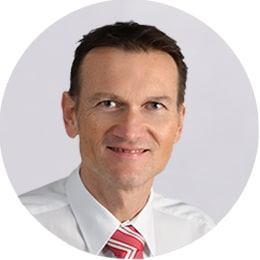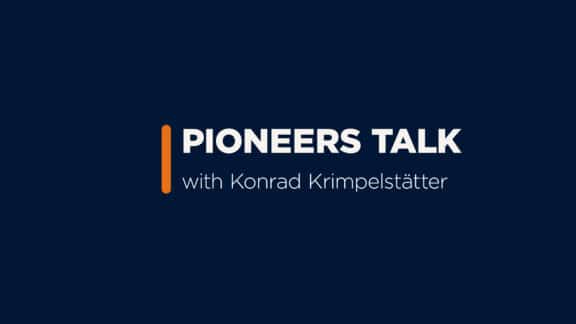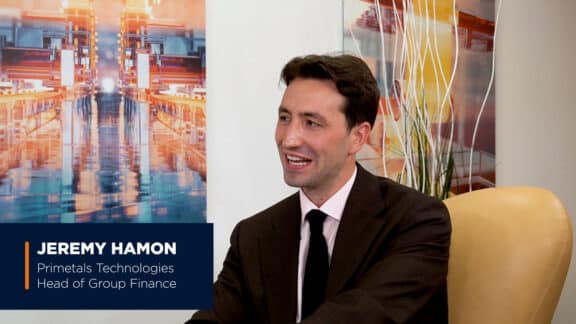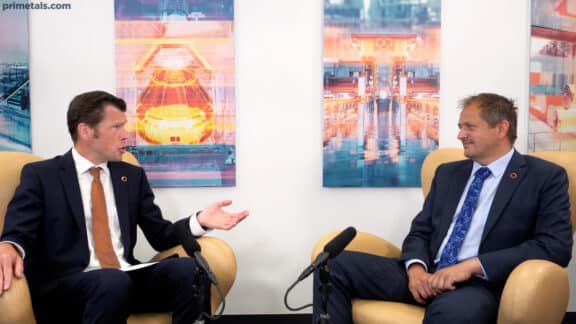Artificial Intelligence is on its way to becoming a fixture in every company. Much like the PC in the Eighties—when the mission was to have “a PC in every home”—AI will one day be as ubiquitous as today’s personal computers. In this session of Pioneers Talk, we take a deep dive into the world of AI business applications with data scientist Sonja Strasser—and we will learn why AI is not replacing us humans any time soon.

E-Mobility Is Here — But Now What? with
Konrad Krimpelstätter
Hello and welcome to Pioneers Talk. My name is Tom Widter and today we have Jeremy Hamon with us. Welcome to Pioneers Talk, Jeremy.
Hamon: Hi, Tom.
Jeremy is the head of the finance department at Primetals Technologies and that means you make sure the cash flow works and you make sure we got money in the bank. That is really important and thank you very much for that because that means we’re able to afford Pioneers Talk so it’s all because of Jeremy that we’re here in the first place. What brought Jeremy to my attention was that he and his team won an award working with AI algorithms in the world of finance and so congratulations by the way, well done. Maybe you want to just say a couple of about what that award and what the project entailed and how it felt to work with artificial intelligence.
Hamon: Thanks, Tom. We always try I think, and that’s true everywhere in Primetals Technologies but as well in finance, to pioneer in our organization and see where we can improve our processes. There’s a lot of tasks every day performed by the finance team which could be repetitive and where we see actually even the qualitative output that one person would bring could be limited while an artificial intelligence comes with so much more power looking at all sorts of financial transactions and seeing what’s the historical background by them, what kind of pattern, how did you behave in the past with these different items or scenarios, and they can deliver quite a good output. We really supported our service provider in developing this by showing what we expected, testing it, and at the end rolling it out successfully. This was for us a really good first step and we expect to see more of that.
I think one of the aspects to artificial intelligence that’s challenging for us human beings is the speed with which it can do certain things and the financial industry has always been a very fast paced industry or certainly in the last couple of decades. I imagine your life is quite fast paced as well and you’re basically connected with financial systems all over the world. Has that stepped up a notch over the last few years, has your life become even faster?
Hamon: Unfortunately, to a certain extent it did. But I think it’s a two-way street. On the one side it went a lot quicker, fintechs of banks have developed a lot providing technologies such as multibank trading platforms so we would do the same transactions but with a lot more competition. We can work a lot more with our own system that is bank agnostic so with a lot less dependence which is fantastic. This continues the other side. The criticism sometimes of the banking industry is that it’s heavily regulated and the past 10 years have definitely pushed this regulation to situations now where commercial banks have taken almost the role of regulators in pushing a lot of control in place on corporate. So, fast-paced but more controlled maybe for the for the greater good of course but there’s no denying that as corporations we’re getting more and more hooked to these possibilities of working with more transparency, with more efficiency, and with less technical dependence on certain institutions or banks and be able to manage our working capital the way we want to.
Actually, transparency I think is an important point there especially with cryptocurrencies coming into the world of finance. Would you, Jeremy Hamon buy bitcoin? Have you bought bitcoin? Have you bought anything with bitcoin?
Hamon: I will not give a financial advice but the answer is simply no. No, and it is probably too late today to, you know, to go on the bubble, Tom. In any case, there is value and cryptocurrencies have to be taken seriously because there’s a message. My problem is that it’s only a message, content wise there are limitations to the message because there are limits implied by the software regulation of the financial system. Everyone doing transactions wants security, transparency, reliability, and efficiency. When you use bitcoin, you pay, and the beneficiary gets it right away. When you do a standard payment it’s not the case. It goes through a lot of different intermediates before it reaches the beneficiary and that takes time and can be stopped either way. You don’t know where your money is on the flow. Cryptocurrency is a message sent, saying we want more disintermediation. I fully relate to this. But on the other side with the current way cryptocurrencies are organized, you skip the regulatory framework not in terms of they’re just an asset of evaluation, you skip the regulator when performing cross-border transfers and for that they will always be limited.
Would that mean that, once a regulator stepped in, it’s very hard to predict what would happen to bitcoin and others? So, maybe would they basically plummet? Or someone steps in and says, look this is how you play the game and then it impacts the value?
Hamon: In some regions it already is. I think they probably would remain as an asset, as an investment asset, for whatever value they are. I personally believe that as standard currency gets digitalized, which means disintermediated in terms of how the checks that are currently done on the way, then cryptocurrency will lose a little bit in value. Now does it mean that we’ll never be able to pay for a coil with cryptocurrency? For sure, with cryptocurrency not, with digital currency yes.
With crypto there’s also this issue of blockchain working in a energy intensive manner and so there’s been criticism concerning their energy consumption. Does that also apply to digital currencies? Maybe you could explain a little more what digital currencies are and why you think they’re the future.
Hamon: Absolutely, digital currency is a version of cryptocurrency that would have been officialized if you want to put it this way. It’s simply saying we agree that there must be disintermediation because the current way of performing payment is too sophisticated and the checks have to be done on the side powered by blockchain. This means whenever you send payments to a beneficiary, the beneficiary would right away receive the flow. It works with payments but also any other kind of financial transactions and on-the-side checks would remain in terms of how you collateralize these transactions, how you perform and know your customer or counterpart process without having to perform these checks at each checkpoint but doing that while the transaction is being done. Naturally there’s an energy price to this technology and so far, we’re not yet at a point where the financial system can look at its own footprint and say, well we may struggle now with the way it’s currently being performed so there will need to be development to make sure that these digital currencies can be put in place. Actually, they are tested in some regions currently. This is the case in China, in Europe it will still take a bit of time and will surely be limited to small transactions because the regulators with disintermediation need to still have a way of controlling and monitoring the flows. It’s important for the economy policy, it’s important for the monetary policy to have a view of the transactions that are being performed.
Is there anything else the financial industry can do to support the transition to carbon neutrality?
Hamon: Looking at its own value chain the financial system is not the most polluting industry even if you would go full beam on blockchain technologies to make payments faster and improve the way they are done. The financial system can support decarbonization though by simply doing its job. There are currently incentives for financial markets to support the transition, we see the EU taxonomy, if we take just a European perspective, to see how customers need to be flagged by their commercial banks in order to define to what extent they could have access to credit lines and have access to financial transactions. This is a good first step and these incentives will be followed by requirements in the coming years. When you look at the price of the carbonization overall you need financial partners that will be able to support this change, and this is where of course they will play the most important role by doing their core job.
Is there anything else in terms of macroeconomic trends that you’re observing that may have an immense impact on the steel industry?
Hamon:
Well, steel producers have definitely realized in the past two years that the coil prices have hit the roof at an all-time high, so this has definitely supported great performances all around. We’ve seen really good results in our peers, and this continues. At the moment, prices and commodity
prices in general are far above the rate that the industry needs to be sustainable. That being said, the steel industry is structurally very much correlated to domestic growth. It’s an international business in a sense because it depends on an international supply chain and procurement but by selling mostly domestically would still have an impact on the local demand and in the current inflation driven economy, we could see a lower demand in the coming months. The question then is how does the steel industry surf the current wave?
There’s so much in this answer and in talking to you I get the sense that there are strategic aspects to what you’re looking at, there’s political aspects, there’s economic aspects, and all that on an international scale. So, how do you locate the important pieces of information? How do you organize your own thinking? how do you know how what you need to do your job in terms of information?
Hamon: Certainly not by just crunching numbers on an excel sheet. As a support function in a corporation in general we need to learn to be silo averse. Internally, we need to learn about what our peers are doing in the organization and externally what our customers are doing, what our suppliers are doing, what institutions around fellow corporations are doing, and this is important and getting informed is definitely the key to make a difference. If i would just look at the business case on the numbers, I would miss the geopolitical and macroeconomic side of things.
When I think about what your workday may look like I picture you sitting at a desk with a lot of monitors with dashboards on them where all this information basically is fed to you. But also, I think you must have in some drawer hidden somewhere a crystal ball that you take out every once in a while, and you peek inside your crystal ball before you make all the important decisions. I wonder is there anything you see in this crystal ball in terms of important trends for the steel industry with of course financial implications that steel producers should be aware of and what will the future of finance look like in say 2040?
Hamon: I guess we need to pick up the crystal ball to answer all those questions. It doesn’t exist unfortunately, unless some people would say Bloomberg is a crystal ball. In general, the way finance will work in the future, and I will be around and I will need to be ready for that, I hope in terms of the general frame that we’ll spend more time on the content and less on the administration. I think there is definitely a trend towards that but, on the other side, I’m hoping that the finance world will have played its role in the macro trend that is decarbonizing. This definitely needs to be empowered and we need to make sure that decarbonization is supported by technological developments. As Primetals Technologies we work a lot on that but as the technology develops, we need to be able to finance that transition as well and for that you need the full industry support behind you.
Thank you, that’s a very complete answer. That brings us to the end of our conversation. Thanks for being here, Jeremy, and thanks to everyone watching. It’s been a real pleasure and I will see you very shortly with the next session of Pioneers Talk. Take care, I look forward to seeing you again.
Pioneers Talk is the new video format of Primetals Technologies, focusing on informative and empowering interviews with experts in metals production and beyond. Topics extend to new advances in digitalization and automation, breakthroughs in green-production solutions, and success strategies for steel producers on all continents.
Sonja Strasser
Sonja Strasser knows all there is to know about smartening up business workflows with artificial intelligence. A mathematician and physicist by training, she wrote her dissertation on best practices for control systems in production processes—and graduated cum laude. Since then, new IT innovations have entered the stage. When not programming and implementing AI solutions for Primetals Technologies, Sonja teaches her own students how to best conceptualize and realize these future-oriented tools.
Tom Widter
Tom Widter joined Primetals Technologies in 2016 and now works in the Marketing and Communications department. He is Editor-in-Chief of Metals Magazine, the company’s customer magazine, and co-host of “Pioneers Talk.” Tom cares deeply about didactics, style, branding, the future of metals, personal growth, and the Oxford comma.


